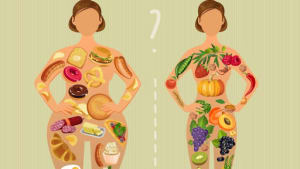
A survey that included a combination of 150 doctors, dietitians, personal trainers, and many others in the health industry proposed this question. 98% of these people were not able to accurately answer.
The goal for everyone is to try and be the healthiest version of themselves from a wellness perspective. In order to achieve this, it is important to stay within a healthy body mass index (BMI), body fat percentage, and waist to hip ratio. As you may already understand, those with a higher BMI have a greater risk of developing cancers, diabetes, and heart-related conditions. Let’s just summarize what a calorie really is and understand the confusing terms that are very popular within the health and wellness field.
Calories?
Now you can understand that the quality of your calories are extremely important; food is not just a number. As we store more body fat on our body, it is important to remember that it is a bit different than the fat that we consume as food. Your body needs to break down whatever food you eat and then it will work through the process to store it as body fat in adipose tissue.
So Why Does One's Body Store Body Fat?
For one reason, taking in more energy than our body burns on a daily basis. If you are familiar with the term Resting Metabolic Rate (RMR). You may remember it to be the amount of calories your body burns at rest. This number will increase naturally as your body digests food and performs activities throughout the day.
How Do We Offset It?
To offset this accumulation of fat mass we must demand that our body produce more energy. In order to do this boosting your metabolic rate will allow you to eat an extra amount of calories. However, it is important to eat meals that do not eat spike your blood sugar (ex. processed foods). In short, you should consider eating a meal that has good quality protein, fats, and fiber.
When You Have Extra Body Fat, What Does That Mean?
For those that have weight loss goals research has shown that going too low in calories isn’t the best strategy. The best strategy is one that includes good quality food like: vegetables, fruit, good quality protein, and healthy fats. A diet should include balanced meals with all of the important macronutrients (protein, carbohydrates, and fats), over-nourishing your body with a lot of micronutrients is another way to make sure you are getting your basic needs.
So Let’s Answer the Question: What Happens to the Fat Mass on Your Body?
Therefore, it is important to: keep your body hydrated, get enough fiber, sweat it out, and make sure to not eat late at night so that when you are sleeping your body can tap into stored adipose (fat) tissue.
Contact us for more information about our weight loss nutrition program, personal training & wellness coaching at Genesis Personal Fitness, 215-504-0100 or info@genesispersonalfitness.com

